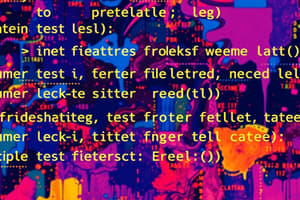Podcast
Questions and Answers
What is the purpose of a while loop in C# programming?
What is the purpose of a while loop in C# programming?
- To define a fixed number of iterations
- To execute a block of code only once
- To create an infinite loop
- To control program flow based on a condition (correct)
In a C# while loop, what does the condition evaluate to?
In a C# while loop, what does the condition evaluate to?
- `null` or `not null`
- `true` or `false` (correct)
- `yes` or `no`
- `0` or `1`
How is the code within the curly braces of a while loop executed?
How is the code within the curly braces of a while loop executed?
- Once only
- As long as the condition is false
- As long as the condition is true (correct)
- Randomly
What happens if the condition of a C# while loop is never met?
What happens if the condition of a C# while loop is never met?
In C# programming, why would you use a while loop instead of a for loop?
In C# programming, why would you use a while loop instead of a for loop?
Flashcards are hidden until you start studying
Study Notes
In C# programming, while loops provide a conditional construct to control program flow iteratively based on a condition. They are often used when you need to repeat actions until a specific condition is met.
The Basics of C# While Loops
A while loop in C# works by repeatedly executing a block of code as long as a certain condition is true. The syntax for a basic while loop is as follows:
while (condition)
{
// code to be executed
}
In this structure, condition is a Boolean expression that evaluates to true or false. The code within the curly braces {} is executed repeatedly as long as the condition is true.
Examples of C# While Loops
Let's illustrate how a while loop works with an example. Suppose you want to print the numbers 1 to 10. You can achieve this with the following code:
int n = 1;
while (n <= 10)
{
Console.WriteLine(n);
n++;
}
In this example, the loop starts with n being initialized to 1. The condition n <= 10 is true, so the code within the loop is executed. The Console.WriteLine(n) statement prints the value of n, which is 1. Then, n is incremented by 1 using the n++ statement. The loop continues until n becomes 11, at which point the condition n <= 10 is no longer true, and the loop terminates.
Breaking Out of a While Loop
Sometimes, you may want to stop a while loop prematurely. In C#, you can use the break keyword to exit a loop early. Here's an example:
for (int i = 0; i < 10; i++)
{
if (i == 5)
{
Console.WriteLine("Quitting after 5");
break;
}
Console.WriteLine(i);
}
In this example, the loop starts with i being initialized to 0. The condition i < 10 is true, so the code within the loop is executed. When i equals 5, the if statement inside the loop is executed, and the break statement is encountered. This causes the loop to terminate immediately, and the program continues executing with the next statement after the loop.
Conclusion
while loops are a powerful construct in C# programming that allow you to iterate through code blocks until a specific condition is met. They can be used in a variety of scenarios, from simple counting tasks to more complex problem-solving algorithms. By understanding the basics of while loops and how to use them effectively, you can enhance your programming skills and create more efficient solutions in C#.
Studying That Suits You
Use AI to generate personalized quizzes and flashcards to suit your learning preferences.




